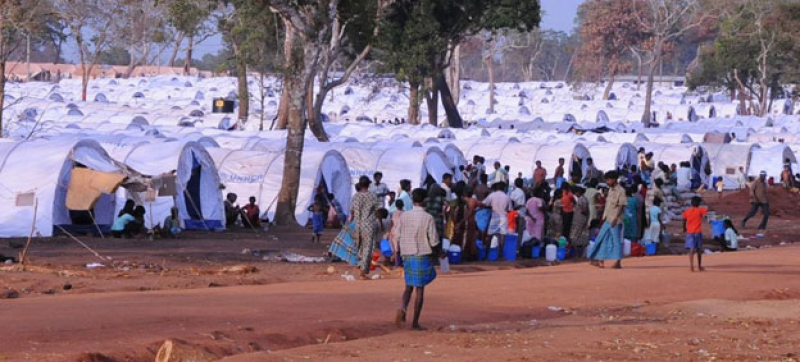- Mojtaba Khamenei Named Iran’s New Leader |
- Iran vows to hit all ME economic hubs if US-Israeli attacks persist |
- Sammilito Islami Bank merger to continue: Governor |
- Biman Suspends Flights to Six Middle East Cities Over Tensions |
- Govt Announces 25pc Rail Fare Discount |
UN Says Sri Lanka Fails to End Impunity, Rights Abuses

A May 2009 photo of an IDP camp outside the town of Vavuniya in northern Sri Lanka. Vavuniya was the site of an alleged massacre of more than 200 Tamil civilians by the army in 1985.
Before his election, Sri Lankan President Anura Kumara Dissanayake vowed to repeal the Prevention of Terrorism Act (PTA) and amend the Online Safety Act in an effort to strengthen accountability, justice, and freedom of expression. However, according to the Office of the United Nations High Commissioner for Human Rights (OHCHR), the government has not followed through on these commitments and continues to exploit systemic gaps that enable impunity and allow new abuses.
In January 2025, Dissanayake launched the Clean Sri Lanka project, an initiative designed to promote a self-sufficient national economy, introduce ethical reforms, curb corruption, and address impunity for human rights abuses. Despite Sri Lanka’s humanitarian situation showing modest signs of recovery since late 2024, humanitarian organizations have raised concerns over ongoing violations and the absence of a clear justice plan.
“Today, an opportunity presents itself for Sri Lanka to break from the past, with the leadership pledging a fresh direction on long-standing issues, including delivering justice to victims, restoring the rule of law, and eliminating discrimination and divisive politics,” said UN High Commissioner for Human Rights Volker Türk. “It now needs a comprehensive roadmap to translate these commitments into results.”
On August 8, OHCHR released a report documenting widespread abuses under Dissanayake’s administration, including the use of draconian laws to silence dissent. The report highlighted the government’s use of the PTA to arbitrarily detain civilians on terrorism-related charges without evidence, disproportionately targeting members of the Tamil and Muslim minorities. According to OHCHR, there were 38 arbitrary arrests in 2024, and 49 in the first five months of 2025.
“Sri Lanka’s extensive security apparatus routinely uses baseless accusations of terrorism to target innocent people, silencing critics and stigmatizing minority communities,” said Meenakshi Ganguly, Deputy Asia Director at Human Rights Watch (HRW).
OHCHR also confirmed the use of torture and ill-treatment in detention centers, alongside at least 13 civilian deaths in police custody in 2024. Former detainees told HRW they had been tortured and that their families received extortion demands for their release. Many continue to face harassment from security agencies, including home visits and threatening phone calls.
In April, 26-year-old Muthuwadige Sathsara Nimesh died in police custody at Welikada Police Station, prompting national outrage and allegations of police brutality. His mother reported that when she visited on April 2, her son’s clothes had been removed and his trousers were discarded in a trash can. Two officers were suspended, but rights groups condemned the pattern of custodial deaths and impunity.
Human rights experts also warned of a sharp decline in civic freedoms, with severe restrictions on speech and expression. On March 22, 20-year-old Muslim salesman Mohamad Liyaudeen Mohamed Rusdi was arrested under the PTA after CCTV captured him pasting a sticker condemning Israel’s actions in Gaza. The Human Rights Commission of Sri Lanka declared there was “a total lack of evidence that Mr. Rusdi had committed any offense,” calling the case a stark example of the PTA’s misuse.
OHCHR further reported enforced disappearances, surveillance, and harassment of activists and their families, particularly those engaging with the UN or international organizations. Many activists said they were threatened with terrorism charges for their work.
The UN stressed the urgent need for a framework to address widespread violations and end impunity. Despite some high-profile cases being reopened, OHCHR noted that none of its highlighted cases have resulted in justice. Progress on critical investigations remains limited, with suspects often acquitted or released, while new abuses continue.
“This process should start with a clear and formal acknowledgment of the violations, abuses, and crimes that occurred,” said Türk. “These measures are crucial to realizing the government’s vision of ‘national unity’ and ensuring there can never be a recurrence of past violations.”

